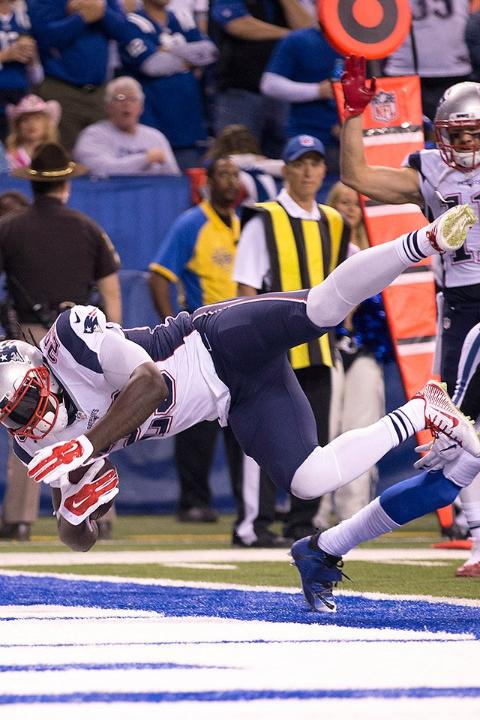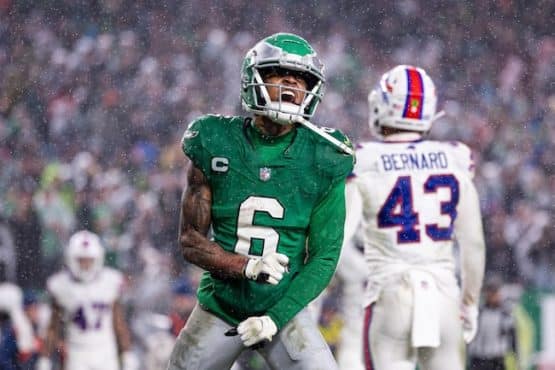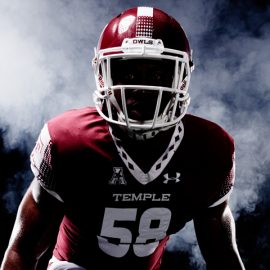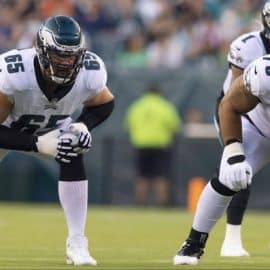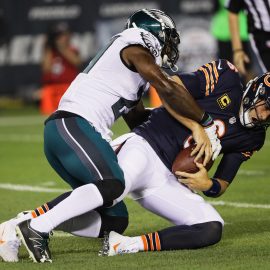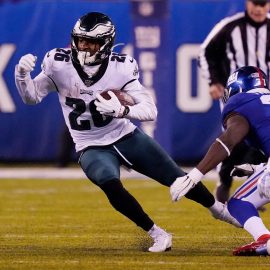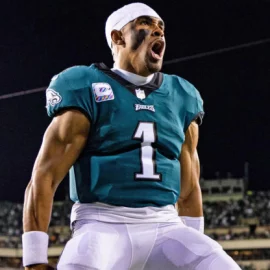LeGarrette Blount scored an NFL-best and franchise-record 18 touchdowns for the Patriots last season on the way to the Super Bowl. Blount did most of his damage inside the 10-yard line and in short-yardage situations. Blount averaged a league-high 5.4 yards per carry in short-yardage situations (defined as third or fourth down with 3 or fewer yards to go). Fifteen of Blount’s touchdowns came with the ball inside the 10-yard line.
Chris McPherson of PE.com got an interview from Blount and here are the highlights:
“It’s just as simple as you’ve got to know your blocking schemes. You’ve got to know what the situation is. It’s a mindset,” Blount said. “You’ve got to know that if it’s third-and-inches or third-and-1, that’s what you get before you expect to get the big play. You’ve got to make sure you secure the first down first. Situational football is big and knowing the situation is big on how you can produce the first downs and the yardage that you can.”
Here are some other highlights from Blount’s press conference:
On why he wanted to come to Philadelphia: “You get the feeling that they have something special here and I want to be a part of it.”
On his role: “They haven’t given me a role. They haven’t placed me in any category just yet. Before I do all that, I have to go out here and learn the offense, learn the playbook, learn what I’m going to be good at, what I’m going to be required and recommended to do. I have to figure that part out first before they label me with anything.”
On winning two Super Bowls and whether or not that can help the Eagles: “It can help a lot. I know what it takes at least from me and what I have to do. I know guys like Chris Long (who played with Blount last season in New England) know what it takes for him and what he has to do to better himself and his position group.”
On bringing the New England culture to Philadelphia: “They’ve had a lot of great players come through here – B-Dawk (Brian Dawkins), the running backs coach Duce (Staley), Donovan (McNabb). They’ve had a lot of great players come through here. I don’t think you need to bring the culture of anybody, of any team over here because they have their own.”
* * * * * * *
PREAKNESS UPDATE— For some inbred reason the Founding Fathers of the Bored have always had a rooting interest in the Preakness Race. Maybe it was the Eagles underdog spirit brewed into in all of us who want to see a horse (or an NFL football team) rise against all odds to win the Triple Crown?

This was supposed to be a duel between the Kentucky Derby winner, Always Dreaming, and Classic Empire, a hard-luck colt who most believed was the best 3-year-old horse in the country. And a duel it was, a heart-pounding one, as the two of them glided down the backstretch side by side as if they were stuck together.
For three-quarters of a mile, the jockey John Velazquez kept Always Dreaming’s head in front. He hovered like a hummingbird, seemingly waiting for the right moment to zip away and put himself on the cusp of aTriple Crown.
But Julien Leparoux, aboard Classic Empire, was not willing to wait for Always Dreaming to make a move. Instead, he gunned his colt around the far turn, squared his shoulders into the stretch and blasted his horse down the rail as if he were a sure thing.
“Second doesn’t mean anything,” the trainer of Classic Empire, Mark Casse, told Leparoux in the paddock before the race. “Let’s go and try to win this thing.”
Up until the last sixteenth of a mile, it looked as if they had. Then Leparoux heard Javier Castellano smooching to his colt, a 13-1 long shot named Cloud Computing. And with every kiss Castellano blew into his horse’s ear, Cloud Computing’s stride stretched longer and the ground between him and Classic Empire disappeared quicker. This was not the duel anyone had expected.
For the last 50 yards, Cloud Computing and Classic Empire shadowed each other, running nose to nose almost until they hit the wire. In the end, Cloud Computing won the only duel that mattered — the 142nd Preakness Stakes.
It was the first Triple Crown victory for Cloud Computing’s trainer, Chad Brown, and the second for Castellano, who also won in 2006 aboard Bernardini. Their partnership has helped them dominate grass in New York and beyond. Brown has won nearly every major turf race in America, including seven Breeders’ Cup races on grass and the Arlington Million, and has trained three Eclipse-Award-winning turf horses.
Castellano was aboard Cloud Computing for the first time on Saturday, a switch dictated by Brown, who wanted his go-to rider to get the colt into the race from the start and keep him there.
It worked. Cloud Computing broke sharply and loomed behind Always Dreaming and Classic Empire for most of the race.
“We figured the race would be won or lost in that first turn,” Brown said, “and he won it right there.”
Cloud Computing covered the mile and three-sixteenths at Pimlico Race Course in 1 minute 55.98 seconds and paid $28.80 for a $2 bet. He earned a $900,000 first-place check that was welcomed by his co-owners William Lawrence and Seth Klarman. The victory carried special weight for Klarman, who turns 60 on Sunday and fell in love with horses while growing up three blocks from this battered old racetrack.
There will be no Triple Crown this year, rendering next month’s Belmont Stakes a nice race but one that has now lost its potentially historic dimensions. For 37 years, from Affirmed’s 1978 Triple Crown sweep to American Pharoah’s in 2015, no horse could grab the sport’s greatest prize, although 13 went to the Belmont with a chance.
Always Dreaming, the prohibitive 6-5 favorite, finished a well-beaten eighth. In Kentucky, he had a perfect, front-running trip on a rain-soaked course that bedeviled many of his rivals — Classic Empire in particular. It was not so easy here.
“I was in trouble on the backstretch when the other horse got him,” Velazquez said. “He just didn’t have it.”
Casse had been eager for this race after the Derby, where everything that could have gone wrong did. In the Derby, Classic Empire was slammed by another rival, McCraken, at the start and pinballed among horses as they headed for the first turn. Still, his colt managed to finish fourth. Classic Empire had won four of his five races last year and was named the 2-year-old champion. And his pedigree is impeccable: His father, Pioneerof the Nile, also sired American Pharoah.
As Classic Empire burst to a three-length lead in the Preakness stretch, Casse believed that his faith in his colt would be rewarded. Then came Cloud Computing, and he found himself thinking what Leparoux, too, would wonder later.
“I got to the lead early — maybe too early,” Leparoux said.
Casse was more blunt. “No excuses,” he said. “We were second best.”
The trainer of Always Dreaming, Todd Pletcher, worried whether his colt could win on just two weeks’ rest. He is as good a sabermetrician as he is a horseman, and he had run only eight horses here previously because he prefers giving them a five-week break between races. He usually takes his Derby contenders back to his base in New York, skipping the Preakness and training until the Belmont.
It may be why he has won two Derbys and two Belmonts but is still looking for his first Preakness victory.
For Brown, Cloud Computing’s victory was a rebuttal to those who believed that as accomplished as he was as a trainer of turf horses, he still had not figured out how to win where America’s most prestigious races are run: on the dirt.
“Best dirt trainer in the country,” Lawrence, the co-owner, whispered to Brown in the winner’s circle.
Add The Sports Daily to your Google News Feed!
